Commentary, J Physiother Rehabi Vol: 7 Issue: 6
Precision Medicine Role in Physical Rehabilitation: Treatment to Individual Needs
Helena Maenpaa*
1Department of Medicine, University of Helsinki and Helsinki University Hospital, Helsinki, Finland
*Corresponding Author: Helena Maenpaa,
Department of Medicine, University of
Helsinki and Helsinki University Hospital, Helsinki, Finland
E-mail: helena@maen.fi
Received date: 22 November, 2023, Manuscript No. JPTR-24-128305;
Editor assigned date: 24 November, 2023, PreQC No. JPTR-24-128305 (PQ);
Reviewed date: 08 December, 2023, QC No. JPTR-24-128305;
Revised date: 15 December, 2023, Manuscript No JPTR-24-128305 (R);
Published date: 22 December, 2023, DOI: 10.35248/JPTR.23.7.1000165.
Citation: Maenpaa H (2023) Precision Medicine Role in Physical Rehabilitation: Treatment to Individual Needs. J Physiother Rehabi 7:6.
Description
Physical rehabilitation encompasses a wide range of therapies aimed at restoring function, mobility, and quality of life for individuals affected by injury, illness, or disability. Traditionally, rehabilitation approaches have followed a one-size-fits-all model, where treatments are standardized based on diagnosis or general guidelines. However, the advent of precision medicine has ushered in a paradigm shift, emphasizing the customization of treatments to meet the unique needs of each patient. Precision medicine, also known as personalized medicine, is a healthcare approach that takes into account individual variability in genes, environment, and lifestyle factors when designing treatment plans. Instead of employing a blanket approach, precision medicine seeks to identify specific factors that influence disease progression, treatment response, and outcomes for each patient. In the context of physical rehabilitation, precision medicine involves the use of advanced assessment techniques, predictive analytics, and personalized interventions to optimize recovery and functional outcomes.
One of the cornerstones of precision medicine in physical rehabilitation is the use of advanced assessment techniques to gather comprehensive data about the patient's condition, functional status, and underlying factors contributing to their impairment. This may include detailed biomechanical assessments, functional movement analysis, Electromyography (EMG), and kinematic evaluations. By employing objective measures and advanced technologies, clinicians can obtain a deeper understanding of the patient's unique biomechanics, movement patterns, and compensatory strategies, guiding the development of personalized treatment plans.
In addition to assessing current functional status, precision medicine utilizes predictive analytics to anticipate future outcomes and tailor interventions accordingly. Machine learning algorithms and predictive modeling techniques can analyze large datasets to identify patterns, correlations, and prognostic indicators that may influence treatment response and long-term outcomes. For example, predictive analytics can help predict the likelihood of functional recovery following a stroke based on factors such as lesion location, severity, and patient demographics. By leveraging predictive analytics, clinicians can make more informed decisions about the most effective interventions for each individual patient. The importance of precision medicine in physical rehabilitation is the customization of interventions to address the specific needs, goals, and preferences of each patient. This may involve tailoring exercise prescriptions, therapeutic modalities, and rehabilitation protocols based on the patient's unique characteristics, functional deficits, and response to treatment. For example, two patients with similar diagnoses may require different exercise regimens based on factors such as muscle strength, joint mobility, and pain tolerance. By individualizing interventions, clinicians can optimize treatment outcomes while minimizing the risk of adverse events or ineffective therapies.
While precision medicine holds great promise for improving outcomes in physical rehabilitation, several challenges and considerations must be addressed to realize its full potential. These include the need for standardized assessment protocols, interoperable health information systems, and interdisciplinary collaboration among healthcare providers. Additionally, ethical considerations such as data privacy, informed consent, and equitable access to precision medicine interventions must be carefully managed to ensure patient safety and autonomy. By utilizing advanced assessment techniques, predictive analytics, and personalized interventions, clinicians can optimize treatment outcomes and improve quality of life for patients affected by injury, illness, or disability. However, realizing the full potential of precision medicine requires overcoming challenges such as standardization, interoperability, and ethical considerations. With continued research, innovation, and collaboration, precision medicine has the potential to revolutionize patient care and transform the field of physical rehabilitation.
 Spanish
Spanish  Chinese
Chinese  Russian
Russian  German
German  French
French  Japanese
Japanese  Portuguese
Portuguese  Hindi
Hindi 